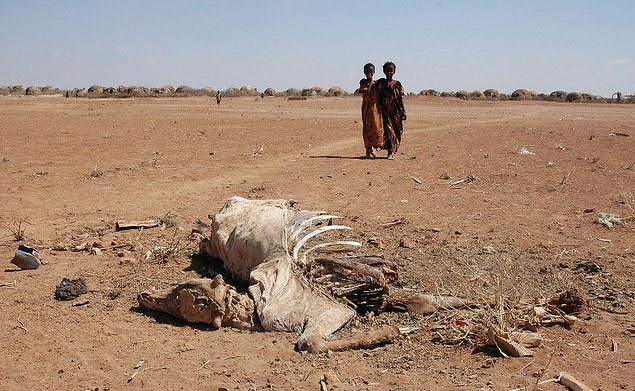While many political pundits like to add their input as to what they consider the main impediments to development in Africa (all of which ranges from corruption, impunity, exploitation, ect.), many often fail to take into account the most debilitating factor to African development – the weather. Much of Africa, particular the horn of African/Sub-Saharan Africa is prone to drought and erratic weather patterns and conditions. Without arable land, which requires frequent rain, many African are unable to cultivate and produce food for basic survival and a lack of vegetation also mean a doom of livestock. Without these basic necessities of survival, many African are left destitute and are susceptible to famine.
Such has been the case recently in the Horn of Africa – Somalia, Ethiopia, Kenya and Djibouti. In the past couple of months, many international and government agencies have been expressing a sense of urgency and alarm at the depleted available food and resources which have given rise to famine, deaths and instability in these countries. While the weather is the major contributing factor, the global rise on food prices and global warming/climate change also plays a major role. The recent dry spell is said to be unprecedented and many people have been forced to leave their homes in search of food. According to UNICEF, millions of children and women are at risk from death and disease unless a rapid and speedy response is put into action.” It has been estimated that 10 to 121 people in these regions are in need of urgent emergency food.
For many years, the image of the malnourished child with the fly circling its head has been used to represent Africa as a whole. While I abhor this image (as I do not believe that it provides as a proper all encompassing or correct view of the continent) it does to some extent represents the situation many of our brothers and sisters are forced to face.
While we cannot control Mother Nature, it is imperative that we do our part to help. Urgent need in the form of donations is required however, it is also important that we look at ways to help prevent situations like this from happening in the future. Many of us in the global north like to think that our over consumption and constant release of pollutants only affects us however; the situation in Africa is evidence that our actions have larger negative global implications. It has been estimated that 16% of the world’s population, most of whom live in the global North, consume 80 percent of the world’s natural resources. One does not need to be a genius or mathematician to see the inequality and possible negative outcome of such a disproportionate distribution of resources.
As residents of the global north, where capitalism and individualism takes precedence over socialism and community, it is easy for us to turn a blind eye to how our actions affect the world as a whole. The situation in Africa should provide as a wake-up call to everyone. We need to re-evaluate our lives, our consumption patterns in the larger scheme of things. If we do not at least embark on some sort of self evaluation, then we run the risk of helping to destroy a majority of the world’s population.

Latest posts by Nekita (see all)
- Before Rihanna there was Grace Jones - December 27, 2014
- Marimba: Expression of Freedom, yet my Afro-Ecuadorians… - December 25, 2014
- Who Makes Claim to Being the Reggae Capital of the World? - December 24, 2014









